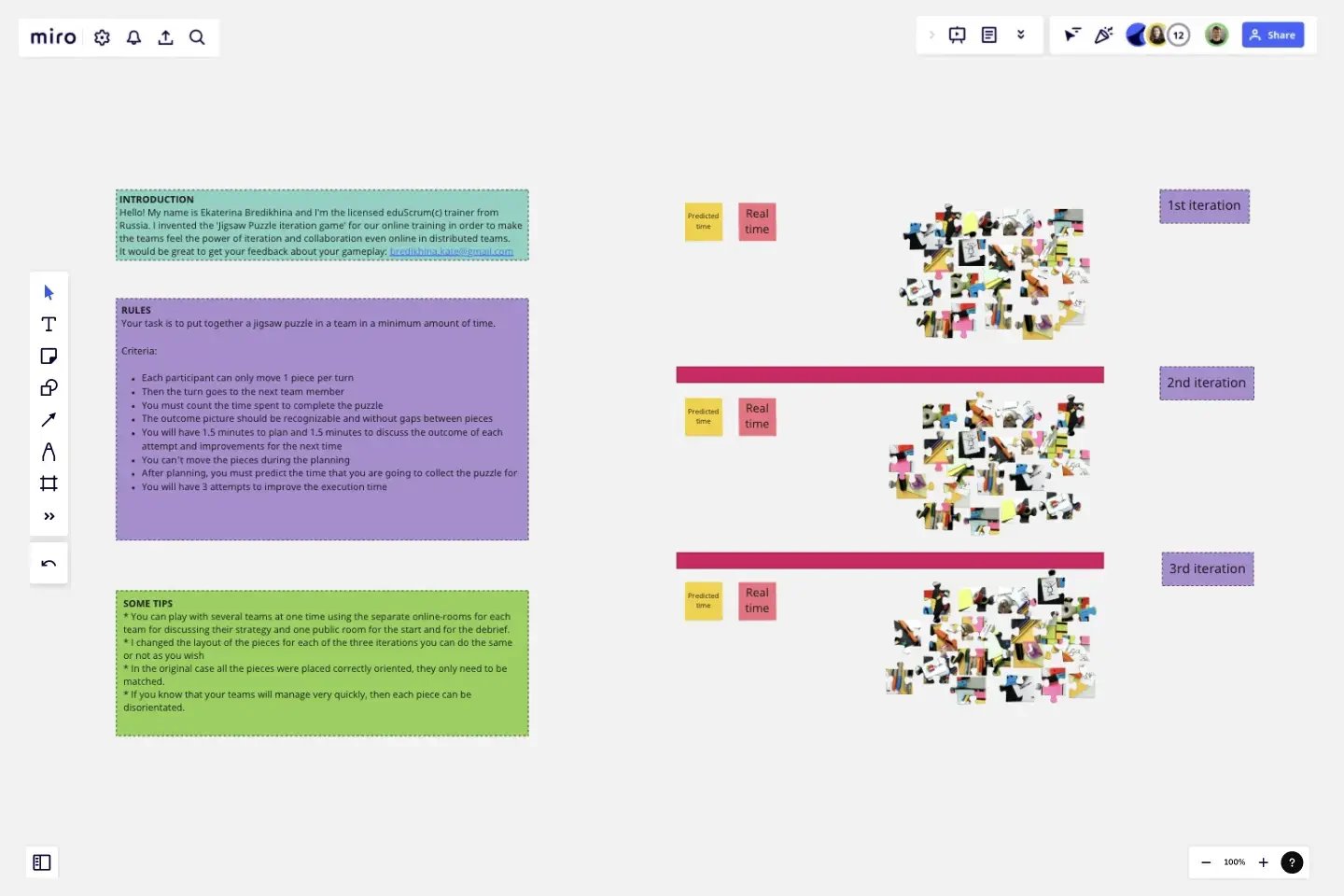Scrum Puzzle Iteration Game
The 'Jigsaw Puzzle iteration game' helps to make the teams feel the power of iteration and collaboration even online in distributed teams.
This template helps to see how people do inaccuracy in time estimates required for the performance of tasks and the importance of the retrospectives in the improvement of working process. It is simple and short so that you can play in with different players.
This template was created by Ekaterina Bredikhina.
Starfish Retrospective
Works best for:
Retrospectives, Agile Methodology, Meetings
The Starfish Retrospective template offers a structured approach to retrospectives using the metaphor of a starfish. It provides elements for identifying what to start, stop, continue, do more of, and do less of. This template enables teams to reflect on past iterations, identify actionable insights, and prioritize improvements. By promoting clarity and focus, the Starfish Retrospective empowers teams to drive meaningful change and continuous improvement effectively.
Customer Touchpoint Map Template
Works best for:
Desk Research, Product Management, Mapping
To attract and keep loyal customers, you have to truly start to understand them—their pain point, wants, and needs. A customer touchpoint map helps you gain that understanding by visualizing the path your customers follow, from signing up for a service, to using your site, to buying your product. And because no two customers are exactly alike, a CJM lets you plot out multiple pathways through your product. Soon you’ll be able to anticipate those pathways and satisfy your customers at every step.
DevOps Roadmap Template
Works best for:
Documentation, Product Management, Software Development
DevOps teams are constantly creating code, iterating, and pushing it live. Against this backdrop of continuous development, it can be hard to stay abreast of your projects. Use this DevOps Roadmap template to get a granular view of the product development process and how it fits into your organization's product strategy. The DevOps Roadmap lays out the development and operations initiatives you have planned in the short term, including milestones and dependencies. This easy-to-use format is easily digestible for audiences such as product, development, and IT ops.
DMAIC Analysis Template
Works best for:
Agile Methodology, Design Thinking, Operations
Processes might not seem like the funnest thing to dive into and examine, but wow can it pay off—a more efficient process can lead to serious cost savings and a better product. That’s what DMAIC analysis does. Developed as part of the Six Sigma initiative, DMAIC is a data-driven quality strategy for streamlining processes and resolving issues. The technique is broken into five fundamental steps that are followed in order: Define, Measure, Analyze, Improve, and Control.
Lean Project Charter
Works best for:
Agile
The Lean Project Charter template provides a streamlined approach to defining project objectives, scope, and success criteria. It emphasizes clarity, brevity, and alignment with Lean principles, enabling teams to kickstart projects with focus and purpose. This template empowers teams to set clear goals, establish shared understanding, and align stakeholders, driving efficiency and effectiveness in project delivery. By promoting transparency and accountability, the Lean Project Charter sets the foundation for successful project execution and continuous improvement.
Skill Cards
Works best for:
Agile
Skill Cards are a dynamic tool for assessing and developing skill sets within Agile teams. They provide a structured framework for reflecting on strengths, weaknesses, and learning goals, fostering a culture of continuous improvement. With Skill Cards, teams can identify skill gaps, distribute knowledge, and tailor professional development plans, empowering you to cultivate a high-performing team with diverse skill sets and shared expertise.
